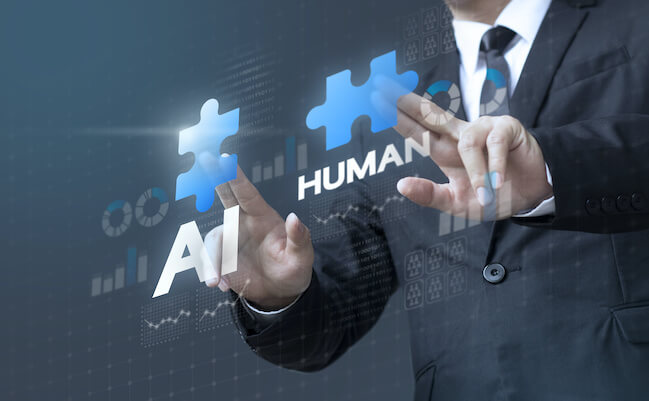Artificial intelligence and expert systems in business can increase organizational capability, but at the same time, despite hype and promise, they are no silver bullet and can also dumb your organization down.
Not long ago, researchers experiment in which optometrists were asked to identify the gender of a person based only on an image of the retina of a human eye. They got it right only fifty percent of the time—no better than guessing. An AI machine learning system fed the same data was ultimately able to determine gender over seventy percent of the time. That’s great for the machine, but unfortunate for the optometrists, because even though the machine was able get it right, no one actually knows how. In machine learning, there is no way to figure out what exactly the system is detecting. The machine becomes the expert and the humans unfortunately are no more expert than before the experiment began.
The CEO of a global European company in Japan once remarked to me the risks involved in developing for company a market intelligence system, like the ones in other markets the company serves around the world. He pondered what it would mean for development of business acumen and judgment of his people if they never learned to validate a market on their own, and always relied on what the machine advised. What would it mean if there was no way of even understanding why or how the machine reached its conclusion, just like in the experiment with the optometrists? Would his people and his business really be better off?
Amazon once built an expert system to identify candidates for leadership development early in their careers in order to remove apparent gender-bias toward men of humans. The machine ought to be objective, at least that was the reasoning, only that the people from whom the machine learned were not. The expert system turned out to be even more misogynistic than the humans. Amazon abandoned the system.
Expert systems using machine learning algorithms always require humans from whom to learn, at least in the beginning, but who will serve as teacher? At least some of the company’s sales and marketing people must know what questions to ask whom and how to analyze the resulting data as a human process before teaching the machine. Mimic the less than skillful, and an expert system will magnify human incompetence with machine-like speed and efficiency.
Machines don’t always get things right. It takes a human to judge when. Yet based on what you know from experience about how people often behave in an organization, what do you think the propensity of an individual staff or manager to override the decision of a much-touted expert system that advises the whole business?
One can always blame the machine with impunity. However, I have known more than one manager to prefer inaction over imperfection, and do the risk calculus accordingly. And that’s assuming there are still people in your company thinking for themselves. Human judgement is like a muscle. Fail to exercise it regularly, and judgement atrophies.
An airline pilot friend of mine once told me of the dangers of following “the magenta line” that appears on the three dimensional navigation display of aircraft indicating to the pilot which way to fly. He remarked that pilots under thirty-years-old follow the magenta line without questioning, even when it is obvious to an older pilot who cut his teeth in a time before such navigation systems that the magenta line is wrong. No matter how good these automated systems are, who do you want piloting your plane.
Too often we look for the technical panacea before the non-technical solutions have been exhausted, to the point where we forget even how to do things ourselves.
Too often we look for the technical panacea before the non-technical solutions have been exhausted, to the point where we forget even how to do things ourselves. Share on XI have watched other business people in services obsess over social media presence making large investments of money, time, and effort with the goal of acquiring new prospects and clients while putting no effort whatsoever in calling up current and past clients and asking for a referrals. In my experience, social media does little for a human relationship based business, whereas simply asking for referrals from a happy client works most of the time. Even in this hyper-connected world and golden age of social media, old-school methods often yield faster and superior results.
I remember watching with astonishment a movie scene depicting Buzz Aldrin making last minute calculations with a slide rule, while scratching with a pencil a pad of graph paper, just moments before touchdown on the moon, to ensure the lunar landing module did not run out of fuel—and as we all know he was successful, with only seconds of burn to spare. As competent as astronauts are today, I wonder how many among them could do the same under pressure without the aid of a computer.
Before you begin looking to implement the next technical innovation to thrust your staff forward, take a beat. How many people on your staff will lose the ability to perform human processes when a machine process just won’t do? How much human judgment in your organization will you abdicate to a computer, and how long before atrophy sets in?
You don’t have to let it, even if in your company atrophy has already begun.


